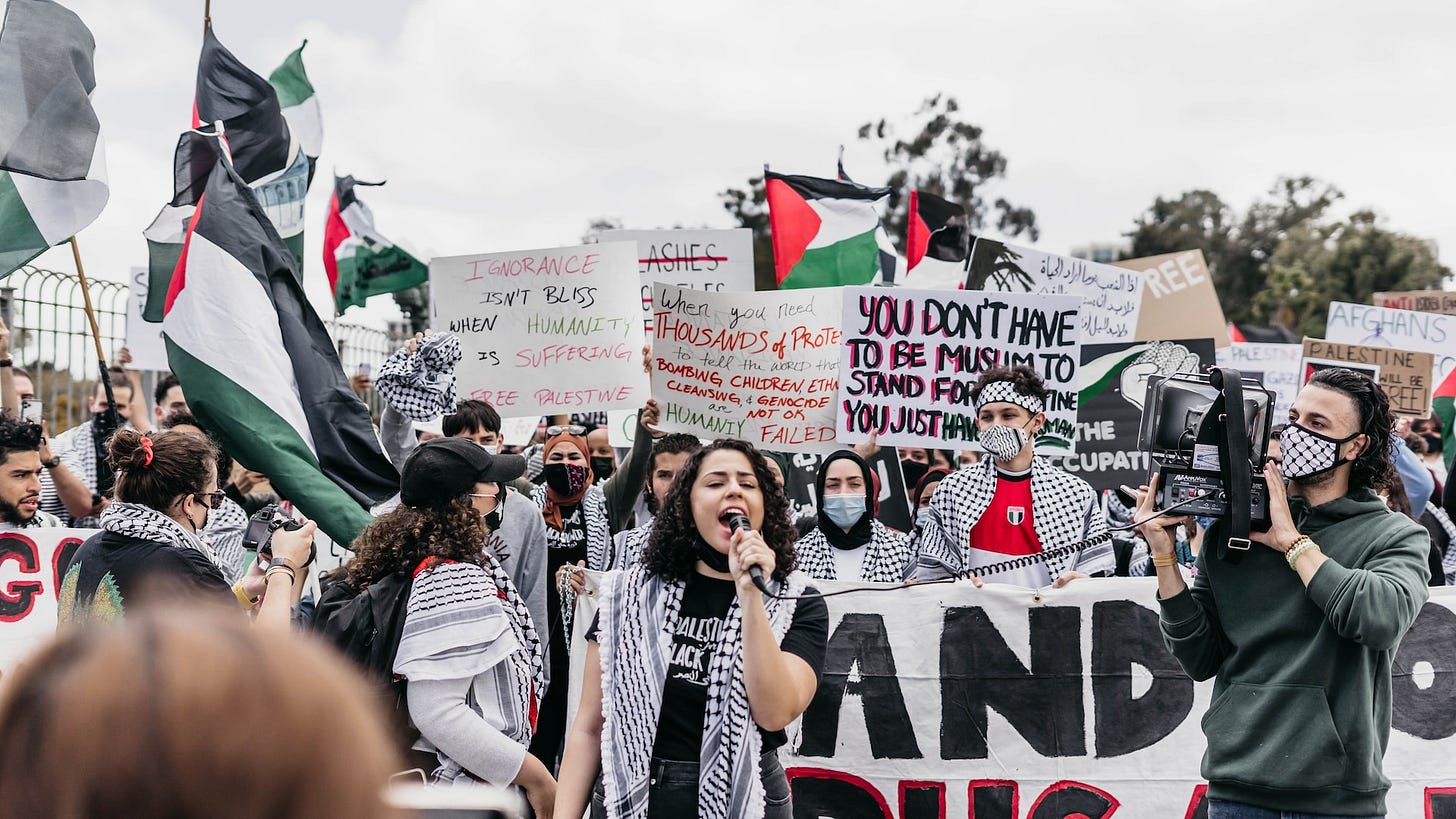Should Spiritual People be Politically Engaged?
a tale from a recovered renunciate. A message from Shambhavi Sarasvati at kindred108.love. We're all kindred here.
Please, call me side-ist
Every now and then, someone writes to let me know that I am not being a proper spiritual person because I'm politically engaged.
I've been posting a lot about the genocide in Gaza. Most recently, a couple of folks called me a new, or at least new-to-me name: "side-ist."
I love this word! So cute. And it reminds me of the old Communist Chinese slur "splitist."
During another occupation and genocide, when Tibetans rose up to oppose Chinese invaders in 1959, Chinese officials denounced the Dalai Lama as a splitist and his followers as adherents to the "Dalai Lama clique."1
By the way, Garchen Rinpoche, a monk, was among the Tibetan armed resisters. I highly recommend watching For the Benefit of All Beings, the documentary about Rinpoche’s extraordinary life. Among many other treasures, it shows us how even the most terrible circumstances can be used to help us to realize.
But back to the question: Should spiritual people be politically engaged?
Express your unique dimension
Svatantrya is a key term in Trika Shaivism. It's most often translated as "freedom." It means something more like freedom of self-expression.
In my tradition, all worlds, beings, and circumstances are the self-expressions of a continuous subjectivity, an alive, self-aware reality. You can call this God. You can call this Shiva. You can call this the natural state. You can call it simply that.
We have many ways of describing realization. One of them is to enjoy more of the freedom of self-expression of this alive, aware reality. Another is being entirely for others.
But that person who has crushed all impurities of ignorance, and who is filled with the state of Bhairava (bhairavī bhāva pūrṇa), for him, work is meant for others, not for his person. He does work, not for his person, only loka kartavyam, for others.2
When we have been released from ignorance about how things actually are, a playful, improvisational freedom of expression reveals itself along with generosity and devotion toward others. Knowledge and devotion are inseparable.
The improvisational playfulness of less karmically bound folks is not the same as doing whatever we want in an ordinary condition. Improvisation involves deep, all-senses listening and a spontaneous response that draws on all of our skill.
Although we are expressions of one, continuous Self, we each improvise in our own way. We have a dimension of equality and a unique dimension.
The dimension of equality is comprised of what I call wisdom-virtue. Wisdom-virtue is what everything and everyone is made by and of. Wisdom-virtue is God, the Self.
When you encounter wisdom-virtue, you encounter unmitigated clarity, self-knowlege, sweetness, compassion, creativity, devotion, playfulness, tenderness, and mercy. Everyone is comprised of wisdom-virtue in equal measure.
The dimension of uniqueness is how each of us expresses wisdom-virtue according to our natural limitations and degrees of freedom.
Generic actions or concepts—such as being politically engaged—or “side-ism”—have no independent status as proper or improper, spiritual or nonspiritual, right or wrong, dualistic or nondualistic.
But when we are more bound, we do have more attachment to things being a certain way according to paradigmatic or abstract concepts.
When we are less bound, we are free to “taste” the freshness of each circumstance and respond improvisationally in diverse and sometimes unexpected ways that express our unique embodiment of the wisdom of the heart. These ways can include political engagement.
Tea and company
I’m a monkey in the Chinese system of astrology. Monkeys are social creatures, playful and collaborative.
Participating in political life is an aspect of my unique dimension. I have been politically active since my early teens. I’ve lived through times when I felt deep anger about injustice and oppression. But anger is not so much a motivation now.
I took sannyasin vows in my early 40s. Shortly after that, I read that my Satguru, Anandamayi Ma, instructed sannyasins not to vote or engage in politics. She was talking to monastics, and I am a householder, but I decided to try that.
For ten years, I stopped voting and engaging in political discourse or activities. And I also did a lot of sadhana during those years.
When ten years had passed, I was in a different condition. The experiment with restricting political engagement was over. There was no longer any need for it.
Now I enjoy opportunities to participate in ways that I hope encourage others to express themselves more freely and realize more of our continuity with each other.
I don’t consider much whether my self-expression should or shouldn’t take a particular form. I’m fine with the love and devotion I feel expressing itself however it does. I’m just alive in the mix, moved by life, and led by the heart.
And with all my heart, I wish the same for you.
Not quite ready to fire up a paid subscription, but want to show your appreciation?
Please join Shambhavi and the Jaya Kula community for satsang & kirtan every Sunday at 3:00pm Pacific. Come in person to 1215 SE 8th Ave, Portland, OR, or join Jaya Kula’s newsletter to get the Zoom link for satsang. You can also listen to my podcast—Satsang with Shambhavi—wherever podcasts are found.
“Crisis on the Roof of the World” by John Demont, Lions Roar: Buddhist Wisdom for Our Time, August 29, 2017, accessed November 15, 2023.
Lakshmanjoo, Swami. Light on Tantra in Kashmir Shaivism - Volume 2: Chapters Two and Three of Abhinavagupta's Tantraloka (pp. 62-63; Location 1268). Universal Shaiva Fellowship. Kindle Edition.






I read and weep. I work with clients who are so moved by the suffering Gaza it stands in Some way for their own. I appreciate the flexibility of the View teachings, reminding us that each of us is in a different condition, and thus there’s no “right” response that must be applied to everyone. 🙏🏼
I feel like (this is my ignorant position) that if we get angry that people don't join us on whatever side we're on we get caught in samsara.